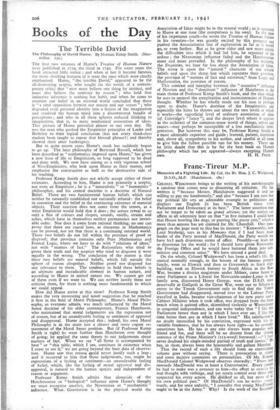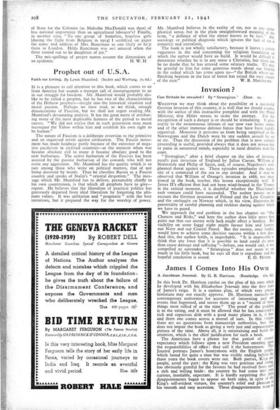Franc-Tireur M.P.
Memoirs of a Fighting Life. By Col. the Rt. Hon. J. C. Wedgwood, D.S.O., M.P. (Hutchinson. as.)
COLONEL WEDGWOOD brings to the writing of his autobiography a candour that comes near to disarming all criticism. He has written it " because Messrs. Hutchinson suggested it and are willing to pay me handsomely," and also " because I am sure that my political life sets an admirable example to politicians and displays our English [it has been British since 1707] Parliament and Democracy at its best." The latter assertion may not be meant to be taken au grand serieux; yet the author can affirm in all solemnity later on that " in five minutes I could have that House howling like dogs, or purring like pussy cats," which is more than anyone has yet claimed for Mr. Churchill. One para- graph on the page next to this has its interest : " Kenworthy, now Lord Strabolgi, says in his Memoirs that if I had been made leader of the Party instead of MacDonald, the Party would not have hail such disastrous terms of office. Possibly—at least not so disastrous for the world ; for I should have given Kenworthy the Foreign Office and he would have battered them into sub- mission and common sense." We have missed a good deal.
On the whole, Colonel Wedgwood's has been a rebel's life. He started normally enough, in the bosom of the famous potter's family, went to Elswick and then to Greenwich to learn ship- building, took an Elswick battery to South Africa in the Boer War, became a district magistrate under Miller, came home to enter Parliament as a Liberal for Newcastle-under-Lyme in the family area, discovered Henry George, won the D.S.O. most deservedly at Gallipoli in the Great War, went out to Siberia as envoy to the Tomsk Government only to find that the Tomsk Government had disappeared, moved over to the Labour Party, travelled in India, became vice-chairman of his new party and a Cabinet Minister when it took office, was dropped from the front bench when it quitted office, skirmished tirelessly at Westminster in congenial independence, and can write today that " I like this Parliament better than any in which I have ever sat; I like this time better than any in which I have lived." His satisfaction is no doubt intensified by his conviction, expressed with his in- variable frankness, that he has always been right—as he certainly sometimes has. ile has at any rate always been popular with friend and foe, and there will be no dissent from the closing sentence of the Prime Minister's (113-word) foreword :—" I have never doubted his single-minded pursuit of truth and justice." He has, in 'tort, always been the honourable and gallant Member.
That the record of such a life should form an entertaining volume goes without saying. There is provocation in plenty and some incisive comments on personalities. Of Mr. Ramsay MacDonald Colonel Wedgwood observes shrewdly : " From 1911 onwards MacDonald was at heart a Conservative. Every sPeecn he had to make was a penance to him—the effort to overlay his real thought with verbiage, and yet retain-control over those who suspected his every action. He disliked us all, but most of a his own political past." Of MacDonald's son he writes =rat tously, and for once unfairly, " I consider that young MacDonald ought to be in the Army." Why? Is the work of the Secrerliti
of State for the Colonies (as Malcolm MacDonald was then) of less national importance than an agricultural labourer's? Finally, in another vein, " To one group of homeless, hopeless girls [during the flight from Belgium in 19141 I scribbled on paper the name and address of Mrs. Runciman as one likely to heap them in London. Hilda Runciman was not amused when the three turned out to be daughters of joy."
The mis-spellings of proper names assume the dimensions of































 Previous page
Previous page